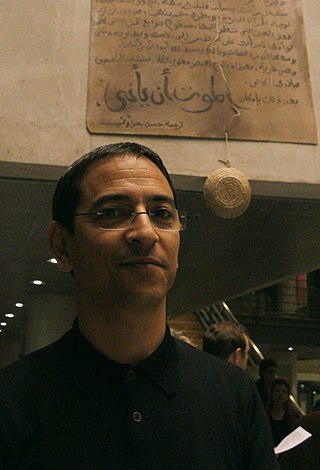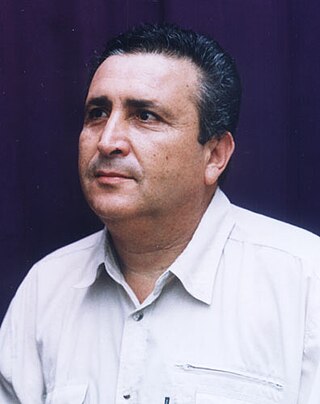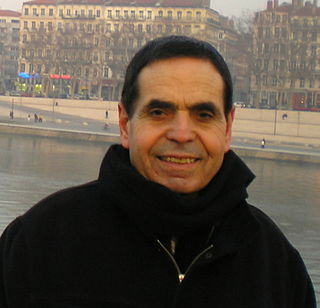Related Research Articles

Tunisia, officially the Republic of Tunisia, is the northernmost country in Africa. It is a part of the Maghreb region of North Africa, bordered by Algeria to the west and southwest, Libya to the southeast, and the Mediterranean Sea to the north and east. Tunisia also shares maritime borders with Italy through the islands of Sicily and Sardinia to the north and Malta to the east. It features the archaeological sites of Carthage dating back to the 9th century BC, as well as the Great Mosque of Kairouan. Known for its ancient architecture, souks, and blue coasts, it covers 163,610 km2 (63,170 sq mi), and has a population of 12.1 million. It contains the eastern end of the Atlas Mountains and the northern reaches of the Sahara desert; much of its remaining territory is arable land. Its 1,300 km (810 mi) of coastline includes the African conjunction of the western and eastern parts of the Mediterranean Basin. Tunisia is home to Africa's northernmost point, Cape Angela. Located on the northeastern coast, Tunis is the capital and largest city of the country, which is itself named after Tunis. The official language of Tunisia is Modern Standard Arabic. The vast majority of Tunisia's population is Arab and Muslim. Vernacular Tunisian Arabic is the most spoken, and French also serves as an administrative and educational language in some contexts, but it has no official status.

Tunisian Arabic, or simply Tunisian, is a variety of Arabic spoken in Tunisia. It is known among its 12 million speakers as Tūnsi, "Tunisian" or Derja to distinguish it from Modern Standard Arabic, the official language of Tunisia. Tunisian Arabic is mostly similar to eastern Algerian Arabic and western Libyan Arabic.
Sudanese literature consists of both oral as well as written works of fiction and nonfiction that were created during the cultural history of today's Republic of the Sudan. This includes the territory of what was once Anglo-Egyptian Sudan, the independent country's history since 1956 as well as its changing geographical scope in the 21st century.
Bensalem Himmich is a Moroccan novelist, poet and philosopher with a PhD in Philosophy from the University of Paris, who teaches at the Mohammed V University, Rabat. He served as Minister of Culture from 29 July 2009 to 3 January 2012.
Amin or Amine, cognate to amen, is an Arabic male given name, meaning "devoted, honest, straightforward, trusty, worth of belief (believable), loyal, faithful, obedient".

Amine Chermiti is a Tunisian professional footballer who plays as a striker.

Said Akl was a Lebanese poet, philosopher, writer, playwright and language reformer. He is considered one of the most important Lebanese poets of the modern era. He is most famous for his advocacy on behalf of codifying the spoken Lebanese Arabic language as competency distinct from Standard Arabic, to be written in a modern modified Roman script consisting of 36 symbols that he deemed an evolution of the Phoenician alphabet. Despite this, he contributed to several literary movements in Modern Standard Arabic, producing some of the masterpieces of modern Arabic belle lettres.

Mohamed Ali Yousfi is a Tunisian writer and translator.

Youssouf Amine Elalamy is a Moroccan writer, visual artist and professor of Media Studies and Communication at Ibn Tofail University. He has published his works mainly in French and occasionally in Moroccan Arabic.
Tunisian literature exists primarily in Arabic and in French. Arabic literature in Tunisia dates to the 7th century, with the arrival of Arab civilization in the region. Arabic literature is more important than francophone literature—which followed the introduction of the French protectorate in 1881—both in volume and value. The national bibliography lists 1,249 non-academic books published in 2002 in Tunisia, of which 885 titles are in Arabic. Nearly a third of these books are intended for children.

Mohamed Ghozzi was a Tunisian poet and critic, known for his poems with rich allusions for Sufism and childhood. He also wrote many tales and several plays. Ghozzi died on 18 January 2024, at the age of 74.
Habib Selmi is a Tunisian novelist and short story writer.

Waciny Laredj is an Algerian novelist, short story writer and academic.

Ali Douagi or Ali ed-Du'aji was a Tunisian literary and cultural icon who is considered to be one of the pioneers of modern Tunisian literature. He is best remembered as "the father of the modern Tunisian short story". Douagi was also known for his versatility as a sketch artist, songwriter, playwright, and journalist.

Amor Ben Salem is a Tunisian Arabic writer.
Shukri Mabkhout, also transcribed Choukri Mabkhout, is a Tunisian academic, critic and novelist. His 2014 debut novel, al-Talyānī, won the International Prize for Arabic Fiction and has been translated into English and Italian.
Majd Mastoura is a Tunisian film actor and translator. At the 66th Berlin International Film Festival he won the Silver Bear for Best Actor for his role in the film Hedi.

Muhammad Al-Moncef Al-Wahaibi is a Tunisian poet, writer and academic.
Mohamed Ait Mihoub, a Tunisian writer, translator, and professor, was born in 1968. He published many books including “Roses and Ash” and “The Romantic Man” which was a translation of Georges Gusdorf’s book “L’homme Romantique”. He won several awards including the Translation Award of Sheikh Zayed Book Award in 2020.
Derija Association is a group that advocates for the use of Tunisian Arabic as a written language. It argues for an expanded public role for the vernacular language as an authentic expression of Tunisian identity and culture. It holds an annual conference and awards prizes for literature written in Tunisian.
References
- ↑ "Amine al Ghozzi wins EU Prize for Literature - English Service". 20 May 2021.
- ↑ "Amine Al Ghozzi | EU Prize for Literature". Archived 1 July 2021 at the Wayback Machine